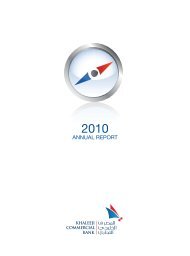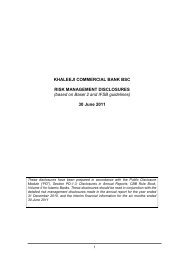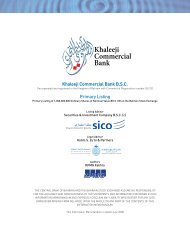2011 Annual Report - Khaleeji Commercial Bank BSC
2011 Annual Report - Khaleeji Commercial Bank BSC
2011 Annual Report - Khaleeji Commercial Bank BSC
You also want an ePaper? Increase the reach of your titles
YUMPU automatically turns print PDFs into web optimized ePapers that Google loves.
KHALEEJI COMMERCIAL BANK <strong>BSC</strong><br />
RISK MANAGEMENT DISCLOSURES<br />
9. Corporate Governance & Other Disclosures<br />
9.1 Corporate governance structure<br />
The <strong>Bank</strong> is governed by the <strong>Commercial</strong> Companies Law No. 21 of 2001 (the “Companies Law”), the Kingdom of Bahrain<br />
Corporate Governance Code (the “CGC”), volume 2 of the Rulebook of the CBB (and in particular the High-Level Controls<br />
(“HC Module”)), and the Bahrain Stock Exchange Law of 1987 (collectively, the “Regulations”).<br />
The <strong>Bank</strong> acknowledges its responsibility to all of its stakeholders and is committed to the highest standards of corporate<br />
governance. The <strong>Bank</strong> believes good corporate governance enhances stakeholder value and provides an appropriate guidance<br />
to the Board, its committees, and the <strong>Bank</strong>’s executive management to carry out their duties in the best interest of the <strong>Bank</strong><br />
and its stakeholders. The <strong>Bank</strong> maintains the highest levels of transparency, accountability and good management through the<br />
adoption and monitoring of corporate strategies, goals and policies to comply with its regulatory and ethical responsibilities.<br />
In <strong>2011</strong>, the <strong>Bank</strong> has adopted the CGC which is effective from January <strong>2011</strong>. The <strong>Bank</strong> has also aligned its corporate<br />
governance policies with the HC Module of the CBB Rulebook which was introduced in October 2010 (built on the provisions<br />
of the CGC).<br />
9.2 Board of directors<br />
As at 31 December <strong>2011</strong>, the Board of the <strong>Bank</strong> comprised ten members. Members of the Board are elected for a three year<br />
renewable term. The current composition of the Board complies with the requirements of the Regulations.<br />
The Board Nominations, Remunerations and Governance Committee (“BNRGC”) reviews the skills and qualifications<br />
required of directors on periodic basis for potential nominee director. A nominee director may be elected by the Board upon<br />
receiving majority of votes during the election process. Positions at the Board are filled in compliance with the <strong>Bank</strong>’s Articles<br />
of Association and the <strong>Commercial</strong> Companies Law. A Director’s membership to the Board shall terminate in the event that,<br />
amongst other things, the Director is convicted of an offence of dishonor or breach of trust or is declared bankrupt.<br />
The Chairman of the Board of Directors is charged with regular supervision and assessment of executive management and<br />
is responsible for leading the Board, ensuring its effectiveness, monitoring the performance of the CEO and maintaining a<br />
dialogue with the <strong>Bank</strong>’s stakeholders. The Board has constituted certain committees with specific delegated authorities to<br />
oversee and guide the management in specific areas of the <strong>Bank</strong>’s operations and decision-making. The Board, either directly<br />
or through its various committees, will oversee the management of the <strong>Bank</strong>.<br />
The Board has formalized the division of work responsibilities between the Board and the <strong>Bank</strong>’s management. Working<br />
in consultation with the <strong>Bank</strong>’s management team, the Board provides oversight for the overall management of the <strong>Bank</strong>’s<br />
business. The Board reviews and approves the corporate strategy for the <strong>Bank</strong> and has overall responsibility for risk<br />
management, financial reporting and corporate governance issues. Matters that specifically require Board approval include,<br />
amongst other things, the financial statements and the acquisition and disposal of companies. The Board also ensures that the<br />
<strong>Bank</strong> upholds the <strong>Bank</strong>’s core values including the values set out in the <strong>Bank</strong>’s internal policies.<br />
The Board Risk Management Committee (“BRMC”) ensures that all policies prescribed are reviewed and updated on annual<br />
basis. . The Risk management department in conjunction with the Internal Control unit ensures the policies and procedures<br />
are updated and adhered to under the oversight of the related management committees. The Board is also responsible<br />
for approving any related party transaction as per the <strong>Bank</strong>’s authority matrix. Related party transactions concerning a<br />
Board member should be minimally approved by the Board Investment and Credit Committee (“BICC”). In addition, any<br />
material transaction defined by the <strong>Bank</strong> (10% of the <strong>Bank</strong>s’ capital) should be approved by the Board. The preparation of<br />
the consolidated financial statements of the <strong>Bank</strong> is the responsibility of the Board of Directors. The duties, functions, and<br />
responsibilities are detailed in the <strong>Bank</strong>’s Corporate Governance Framework.<br />
Members of the Board have access to the <strong>Bank</strong>’s management at all times. The CEO together with the <strong>Bank</strong>’s senior<br />
management monitors the <strong>Bank</strong>’s performance against pre-set corporate objectives and manages the <strong>Bank</strong>’s day-to-day<br />
affairs based upon the policies, objectives, strategies and guidelines lay down and approved by the Board from time to time.<br />
Risk Management Disclosures<br />
105










